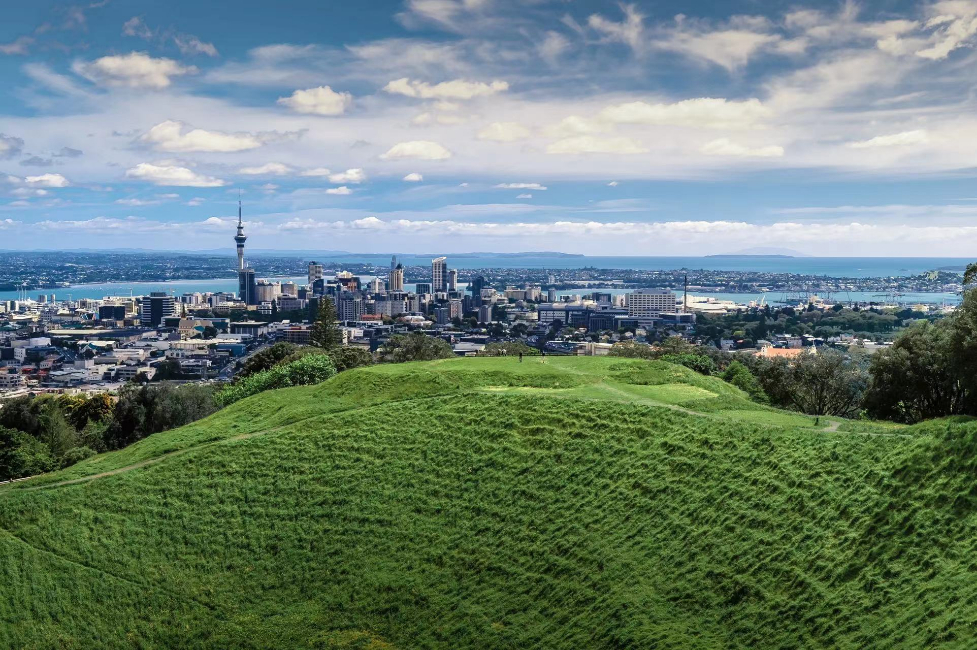
A scene of New Zealand. Photo: VCG
Editor's Note:
This year marks the 50th anniversary of China-New Zealand diplomatic relations. On November 18, Chinese President Xi Jinping met with New Zealand Prime Minister Jacinda Ardern in Bangkok on the sidelines of the 29th APEC Economic Leaders' Meeting, during which President Xi called on both sides to enhance communication, step up mutual trust and accommodate each other's core interests and major concerns to ensure that bilateral relations stay on the right course for sustainable development.
The New Zealand government needs to make sure it walks the strategic tightrope very carefully and maintains good relationships with both the West and China, says John Key (Key), former prime minister of New Zealand, in an interview with Global Times (GT) reporters Yu Jincui and Bai Yunyi. Key believes China is critical to the health of New Zealand's economy and strongly supports New Zealand maintaining good relationship with China.
GT: This year marks the 50th anniversary of China-New Zealand diplomatic relations. How do you see the prospects for the future development of the bilateral relations? What role do you think relations with China will play in New Zealand's foreign policy in the future?
Key: China is our largest export market. So it's very critical to the health of the New Zealand's economy. We're a major food producer and China is a major food importer. So there will be huge amount of both trade and opportunity over the next five years. I think the geopolitics of the last five years has been very challenging. Relationships have deteriorated between the West and China. And I think the challenge now is try and rebuild some of that trust.
From New Zealand's point of view, I've always held a view that we are lucky: We always have had very good relations with our traditional allies, the United States, Australia, the UK and Canada. But we also enjoy a fantastic relationship with China. We've had a one-China policy. We've been among the few countries in the world that's had a free trade agreement with all parts of China: the mainland, Taiwan and Hong Kong. They were completed under my time as prime minister under the support of the government in Beijing.
I think in future New Zealand government needs to really make sure it walks that tightrope very carefully and want to try to have good relationships with the West, of course but also with China. Some countries have taken a more aggressive approach, Australia, for instance, with China. But I've been a strong supporter of New Zealand having a good relationship with China. I think it can be win-win on both sides. It doesn't mean that we can't discuss more difficult issues. In fact, I think you're more likely to discuss difficult issues with your friends than you are with people that you're trying to shout at them. So to me, I encourage our politicians post my time to choose the words carefully and think about building the best relationship we can. And we disagree with all sorts of countries. We don't agree with America's death penalty. We don't agree with some of the migration policies Australia has. There have been all sorts of countries, so we will have areas that need discussion and open conversation to explore points of difference. Having good and open dialogue is what leads to better outcomes.
Some people in the West want to see something change in China. China is more likely to take on board those views from people that treat and trust them as a friend than someone just being constantly negative about them.
GT: In your opinion, where do "shared interests" of New Zealand and China lie?
Key: There're many folds. One is obviously trade and the opportunities to export to each other's economy. I think, secondly, the exchange of people, whether it's tourists or students or visitors to both countries. I think we also are both committed to a view that climate change is a serious issue that needs to be dealt with. We both believe in peace and stability in the region. China is a major player in the region and a major leader. I think China and New Zealand share the view that global trade is important, so we've been supportive of trade agreements and the likes.
There are many areas where New Zealand and China share very, very similar views. When the times that I went to Beijing to see the leadership or when the Chinese presidents or premiers came to New Zealand, there were lots to talk about and lots in common. We always discussed issues that could be challenging, but we do it in a way that we are respectful of each other's perspective and appreciative of the changes we're making.
GT: As competition between China and the US intensifies, the relationship between China and the "Five Eyes" countries is becoming more and more complicated. From Beijing's point of view, Washington is trying to make the Five Eyes alliance its tool against China. In your opinion, should the Five Eyes Alliance make confrontation with China one of its priorities? Does New Zealand have any intention of seeking to contain China together with the US?
Key: I am not in government anymore and I'm not in politics anymore, so I can't speak thoroughly about what the government will do. I can tell you what I think they should do.
We were also a member of the Five Eyes alliance the entire time that I was prime minister, but we had a very strong relationship with Beijing and with Washington. I think that you're right that the United States has tried to use the Five Eyes as a way of building a block which is more aggressive toward China. But when New Zealand says it has an independent foreign policy, what the independent foreign policy means is we make decisions that are in the best interest of New Zealand. Now, the Five Eyes agreement allows us to share intelligence that would be too vast, too expensive, too difficult for us to have access to on our own. It's an important relationship from our point of view, but because we are part of it and because we have a good relationship, for instance, with America, doesn't mean by definition we have to have a bad relationship with Beijing.
New Zealand can enjoy good relations with both. And I think that comes down to ultimately New Zealand needs to say what it believes, not what another country believes. I don't think New Zealand should just parrot things that are said by the Americans or anybody else. They should make its own mind up and exercise its own judgment of what they think is right.
GT: You said Australia's tough talking approach to China was counterproductive and you also urged the New Zealand government to stay close to China. Can you elaborate your views and why you think New Zealand shouldn't follow the Australia's way in dealing with China?
Key: I don't think it's new that Australia has more aggressive, parochial stance against China. I think, for a long time now Australia has been much more aggressive and much more confrontational. That's the decision that they have made based on the outcomes they want, then they're entitled to do that. That's the foreign policy. But I don't think New Zealand should follow that course, because somebody else might want it, or secondly, because we believe it to be the outcome that we want.
I can't see why that would be the outcome we would want. China is our largest trading partner - probably will be forever if we treat it properly. What would be gained if we were to adopt a similar sort of rhetoric against China? Me? Or would it actually achieve anything? What would be the outcomes that would be achieved by there? I think personally the outcomes would be very poor and they'd be counterproductive to changes.
Yes, we want to see peace and stability in the region. In the South China Sea, we urge all the parties to obey the law of the sea and all of these things, but calling anyone names isn't going to make that work any better. We're far better to say this is our perspective. This is how we do things. We encourage you to do that as well.
And also we don't always have complete facts or knowledge. The West has a view that China has a very poor record on human rights. In my time, when I was prime minister, we always raised human rights issues as a broad block issue with the leadership in China. And they offered a different perspective. So it's always difficult to judge what's right and wrong. I think most New Zealanders would take the view that human rights is an important issue. We expect New Zealanders to enjoy freedoms and in the right to do many things, and while we have to respect other countries that have a different system.
GT: Chinese President Xi said that China is willing to coordinate closely with New Zealand to jointly promote peace, stability, development and prosperity in the Pacific island countries region recently during his meeting with New Zealand Prime Minister Jacinda Ardern. As the former prime minister of New Zealand, how do you view China's relations with the South Pacific island countries? Does the relationship pose a threat to New Zealand?
Key: I don't think it poses threats. The fact that China is building friends and better relations with countries around the world is not new. By the way, it's not solely unique to China either. China's been actively building those friendships for a very long time, and will do so in the future, so, by the way, does the United States, and so does New Zealand when it wants to win a seat on Security Council.
I think the main thing I would say in the South Pacific is these are countries that are fundamentally quite poor. They actually need support and development. I've always taken the view that we have a deep knowledge of them in New Zealand, if we can work with China we actually can build better outcomes. When I was prime minister, for instance, we worked with China on a water treatment plant in the Cook Islands and we worked with them in other parts of the Pacific. And so, to me, that's a better outcome, both for China and for those countries.
I think the fear in the West is that China would build relationships with countries like Solomon Islands to allow it to build the outreach of its military capability. They assume that China wants to be militarily aggressive. But history doesn't really support that view. That's a view that a lot of people in the West hold. But the question is: Is it right?
China believes very strongly in its territorial rights over Taiwan or Hong Kong or Tibet. But actually, we, as countries, for the most part, have a one China policy which says we respect China's territorial rights. Then the question is whether China is going to militarily undertake action against other countries. There's no evidence to support that. There's no evidence in history that they have done it.
This is the second part of the GT interview with the Right Honorable Sir John Key. The first part focusing on China's development over the past 10 years was published in October.

